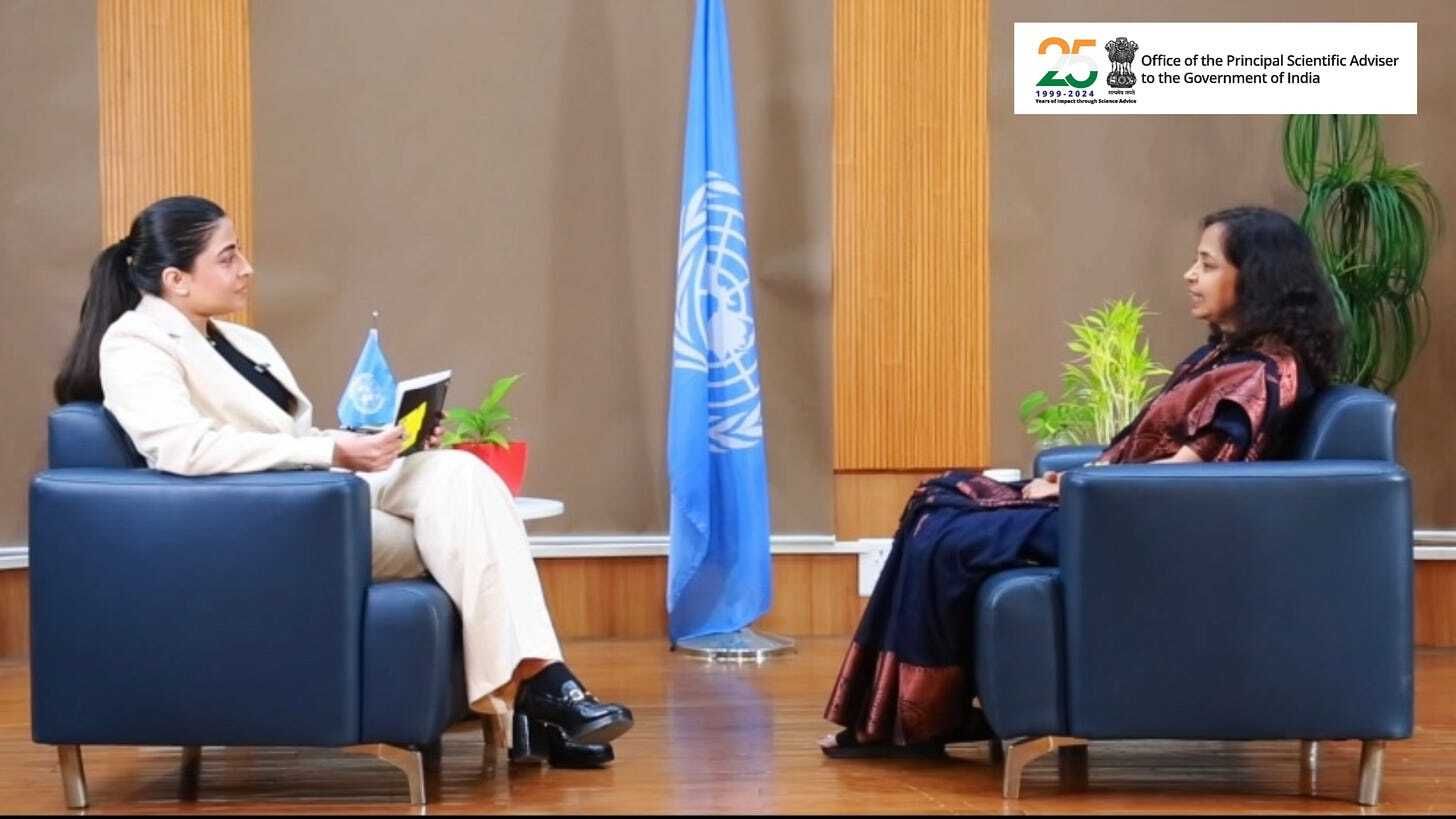In a world obsessed with what's next: AI, quantum tech, deepfakes, data wars. It's easy to forget who's quietly building the future for all of us.
In the latest episode of our podcast, I had the honour of speaking with Dr. Preeti Banzal, Adviser and Scientist G in the Office of the Principal Scientific Adviser to the Government of India, one of the most quietly powerful voices shaping India’s tech-policy landscape.
Our conversation touched on a wide range of topics, from India’s AI future to gender equity. Still, what stayed with me most was how it evolved into something deeper: a masterclass in listening with intent and leading with purpose. A reminder of the quiet power of deep listening as both a personal compass and a strategy for governance.
She’s not just a telecom veteran or an AI policy expert; she’s a first-generation STEM student from a business family who cracked the UPSC, helped lay the foundations of India’s early telecom networks, and is now steering some of the country’s most ambitious tech governance frameworks from ethical AI to quantum communications.
Designing for Diversity
You might be thinking, "AI policy isn’t my thing." But this episode isn’t just about machine learning; it’s about human learning.
We discussed ethical AI at length. In Dr. Bansal’s words, the Indian context demands more than fairness; it demands inclusivity. With a population as diverse as ours, AI cannot afford to be neutral; it must be intentionally equitable.
She spoke about India’s approach to AI not just as a tool for innovation, but as a lever for social good. While the EU enforces heavy regulation and the U.S. leans into open innovation, India is walking a deliberately balanced path.
The national AI mission focuses on three pillars: accessibility, equity, and safety especially in critical sectors like agriculture, education, and healthcare. Tools like Bhashini and AI Kosh are already making AI resources available in local languages, helping to unlock grassroots innovation across the country.
India on the Global AI Map
What makes India’s position in the AI space unique?
Dr. Bansal says it’s our strength in digital public infrastructure, UPI, Aadhaar, DigiLocker, and now, IndiaAI. We’re not just building tech for ourselves; we’re offering it to other countries as public goods.
The IndiaAI Mission is now focused on building computing infrastructure, vernacular NLP tools like Bhashini, and providing free training through FutureSkills Prime.
“We don’t want AI for a few. We want AI for every villager, every worker, every child.”
The Three Biggest Ethical Dilemmas in AI by 2030
1. Data Privacy & Security
Especially for rural and first-time tech users, education and meaningful consent are key. Protecting sensitive data must go hand in hand with building trust in digital systems.
2. Algorithmic Bias & Fairness
If we don’t de-bias datasets today, we risk automating discrimination tomorrow. Fairness must be built into both training data and decision-making systems.
3. Accountability Across the Chain
From developers to deployers, we need a shared liability model to address tech-related harms. Responsibility shouldn’t end at the code it must extend to impact.
Women, AI & Representation
A recurring theme in our conversation was gender. Women still make up only 10–20% of participants in AI development. And that’s not just a “pipeline problem” — it’s a representation problem. If the teams building the future don’t reflect the population, the tools they build will inevitably miss the mark.
Dr. Bansal makes a compelling case for interdisciplinary diversity in AI. We don’t just need more women engineers, we need women from the humanities, psychology, rural sectors, and beyond.
“You can't fight what you don’t see. If women don’t know bias exists in code, how will they challenge it?”
You’ve Heard the Hype — Here’s the Infrastructure
India AI Portal – A goldmine of resources, from open data sets to free AI courses.
Bhashini / Anuvadini – NLP tools to bring AI to every Indian language.
Futuriskills Prime – Free upskilling programs under the National AI Mission.
AI Kosh – Open-source repositories for developers and startups.
What Would She Say to a 15-Year-Old Girl in India Today?
“You don’t need to be from a big city. You don’t need to have all the answers. Just stay curious. Ask hard questions. Use tech to make a difference. We need your voice in this conversation.”
In a world rushing to build faster AI, stronger models, and newer platforms, Dr. Banzal reminded me that the real superpower isn’t speed. It’s listening.
Let this be your reminder this week:
You don’t have to be an expert to belong in the room. You just have to keep showing up.

Whether you're building in tech, funding the future, launching a startup, or just finding your way, this conversation is a must-listen. It offers rare insight into the intersection of tech, AI, equity, and the innovation ecosystem in one of the world’s most dynamic and fast-evolving markets: India.
Full episode highlights :
What does ethical AI mean in India’s context, and how to get it right?
How can policy frameworks tackle gender bias in AI systems?
India's role in global AI governance and the possibility of a “third way”
What ethical challenges will AI face in emerging economies over the next decade?
How can we design AI ecosystems from day one to protect marginalised communities?
Her vision for the next decade of AI in India: the opportunities, the ethical risks, and the communities we must not leave behind.
How India is balancing AI growth with job preservation in rural and informal sectors.
Your feedback helps us shape future conversations. I’d love to hear from you. Drop me a note, suggestion, or just say hi right here. 📨
About the Guest
Dr. Preeti Banzal is a senior Adviser and Scientist G in the Office of the Principal Scientific Adviser to the Government of India. With 30+ years in telecom, emerging tech, and global policy, she plays a key role in shaping India’s AI ecosystem. She contributes to national frameworks on trustworthy AI, quantum tech, and cyber-physical systems, and serves on several high-level committees across MeitY, DoT, and DST. A respected policy leader and researcher, Dr. Banzal combines deep technical expertise with strategic vision in AI and innovation.
A respected scientist, policy leader, author, and researcher, she holds a Ph.D. in Disaster Communication, an MBA in Human Resources, and a Bachelor’s degree in Electronics and Telecommunication Engineering, a testament to her multidisciplinary brilliance and lifelong commitment to public service and innovation.
And hey, if this sparked an idea or made you think differently, share it with someone who needs to hear it. 💬✨
Follow us on Instagram!




